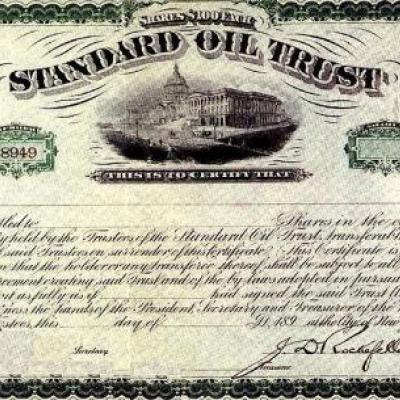Human Genome Sciences (HGS) was not a company with normal ambitions. At its inception, HGS aspired to dominate not only the field of genomic science, but also emerging markets for regenerative medicines designed to meet the needs of ageing populations. Fred Ledley asks whether HGS could have become the Standard Oil of our generation.
Human Genome Sciences (HGS) was not a company with normal ambitions. From its founding in 1992, HGS aspired to dominate the newly emergent field of genomics. The company’s strategy was not simply to mine the human genome for novel sequence elements that could be refined into drug targets or biological products, but rather to use “omics” approaches to systematize and automate biopharmaceutical development. Moreover the company’s intent was not only to develop novel therapeutic products, but to discover regenerative medicines that would meet the needs of ageing populations. The company’s ambitions were evident in annual reports that featured Greek gods and saints as metaphors for the company’s quest along with headlines such as “towards victory over disease” (1998) and “the new face of pharmaceuticals” (2000).
A recent paper from our group (McNamee, L.M., Ledley, F.D. (2013) Assessing the history and value of Human Genome Sciences. J. Com. Biotech. 19) examined the history of HGS, focusing on the relationship between capital investments, the company’s valuation, its accumulation of intellectual property, and its product pipeline. This technical analysis highlighted the failure of markets to value HGS’ intellectual property portfolio or product pipeline, which ultimately caused the company to be acquired by GlaxoSmithKline (GSK) for a “fair value” that was less than the total capital investment in the company.
Given HGS’ early ambitions, however, the more interesting question may be “could HGS have become Standard Oil? The question is not entirely facetious.
Like HGS, Standard Oil was at the forefront of the science and technological innovations of its era. Standard Oil initially grew to prominence with its patented Frasch-Burton process for fractional distillation, which enabled the company to produce kerosene from the high-sulphur oils being discovered in Ohio. The company continued to invest in research and, in the words of the US Supreme Court, was “…unremitting in their efforts to improve the processes of refining.”
Standard Oil was not the only corporate enterprise to emerge from the inventions and innovations of the 19th and early 20th centuries. Carnegie Steel, later US Steel, was the first US company to license the revolutionary Bessemer Process for steel production, American Tobacco was an early adopter of the automated cigarette rolling, and companies like General Electric, Westinghouse, and AT&T were organized around innovations in electricity and communications. So too, the modern pharmaceutical industry emerged during this era based on advances in organic chemistry and novel technologies such as the tablet press.
While each of these companies was at the forefront of technological innovation, they were also at the forefront of business innovation. Standard Oil famously created a vertically integrated enterprise that funneled oil from its wells into its transportation, refining, and marketing network. Similarly, US Steel grew to control mining, coke and ore production, and steel production, but also built a network of railroads and steamships, while American Tobacco controlled the processing, production, and marketing of tobacco products. The business innovations of the era not only improved efficiencies through vertical integration and scale, but also mass production as well as fundamental changes in banking practices, management, marketing, labor relations, and business law; not to mention the monopolistic practices that would ultimately cause these companies to be dismembered. In ordering the break-up of Standard Oil in 1911, the Supreme Court noted that the company was “…guided by economic genius of the highest order, sustained by courage, by a keen insight into commercial situations, resulting in the acquisition of great wealth, but at the same time serving to stimulate and increase production, to widely extend the distribution of the products of petroleum at a cost largely below that which would have otherwise prevailed…”
Perhaps HGS could never have become Standard Oil. Perhaps the innovations arising from the “omics” era are not as great as those that empowered the great corporations of the late 19th and early 20th centuries. Perhaps the potential markets for products of these innovations are not as large. While these reservations may be fairly debated, what is clear is that there have been no innovations in the business models for “omics” comparable to those that accompanied the technological innovations of the earlier age.
HGS, and other companies comprising the genomic sector, adopted business models that were familiar to the venture capitalists and the biopharmaceutical industry, and most were eventually acquired and seamlessly integrated into established pharmaceutical companies. While some individuals acquired significant wealth from genomics (HGS’ CEO was briefly biotech’s first billionaire in 2000), it is hard to imagine critics of the industry describing its leaders as “economic genius of the highest order.”
It may, in fact, be silly to consider similarities between HGS and Standard Oil; there are simply too many differences. But that is exactly the point. Genomic technologies, and the market opportunities for biopharmaceuticals to manage the health and wellness of ageing populations, are unprecedented. Nevertheless, while HGS avidly embraced innovation in science and technology, it failed to explore comparable innovations in business.
Business models have been described as “a focusing device that mediates between technology development and economic value creation,” and an extensive body of research suggests that successful innovation requires an effective synergy between a company’s technologies and business model. Could HGS have become Standard Oil with critical innovations in business to complement their novel technologies? We will never know.
Fred Ledley is a professor in the Department of Natural and Applied Sciences at Bentley University and Director of the Center for Integration of Science and Industry at Bentley University





